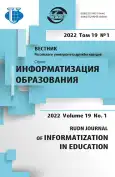The pyramid method in the conditions of the digitalization of education
- Authors: Pak N.I.1, Barkhatova D.A.1, Khegay L.B.1
-
Affiliations:
- Krasnoyarsk State Pedagogical University named after V.P. Astafyev
- Issue: Vol 19, No 1 (2022)
- Pages: 7-19
- Section: INFORMATIZATION OF EDUCATION: A GLOBAL PERSPECTIVE
- URL: https://journal-vniispk.ru/2312-8631/article/view/321317
- DOI: https://doi.org/10.22363/2312-8631-2022-19-1-7-19
- ID: 321317
Cite item
Full Text
Abstract
Problem statement. The digital transformation of education necessitates new approaches to the development of digital educational resources, the design of educational and scientific projects. They should provide a high degree of personification of training, structure the processes of organizing, monitoring and assessing the quality of educational products and results. In the process of digitalization of education, the goals of the educational system are expanding. In this regard, the work is devoted to the substantiation of the pyramid method for solving educational problems that meet the modern requirements of a digital society. Methodology. The analysis of the pyramid method, developed by Barbara Minto, used in the design of roadmaps for business development and contributing to the development of structural thinking, as one of the most sought-after qualities of a modern specialist, made it possible to highlight a number of advantages and benefits in the case of transformation of this method to solve educational problems. In particular, the method is convenient for the development of educational content in the format of a pyramidal tree of knowledge, for the formation of clear plans and assignments for students on the topics of coursework and diploma works, for monitoring and assessing the quality of educational results, complex systems and objects. Results. Examples of using the pyramid method for creating inverted educational resources, increasing interactivity during lectures and practical classes, organizing control and self-control of students’ knowledge, monitoring and assessing the quality of educational resources and objects are shown. Conclusion. The pyramid method facilitates the process of creating digital educational resources that correspond to the maximum extent to the characteristics of the modern generation and satisfy the principles of personification of learning. Its mastering and application in educational activities by the students themselves contributes to the development of their structural thinking.
About the authors
Nikolay I. Pak
Krasnoyarsk State Pedagogical University named after V.P. Astafyev
Email: koliapak@yandex.ru
ORCID iD: 0000-0003-2105-8861
Doctor of Pedagogical Sciences, Full Professor, Head of the Department of Informatics and Information Technology in Education
89 Ada Lebedeva St, Krasnoyarsk, 660049, Russian FederationDarya A. Barkhatova
Krasnoyarsk State Pedagogical University named after V.P. Astafyev
Email: darry@mail.ru
ORCID iD: 0000-0001-5121-7419
Candidate of Pedagogical Sciences, Associate Professor, Associate Professor of the Department of Informatics and Information Technologies in Education
89 Ada Lebedeva St, Krasnoyarsk, 660049, Russian FederationLyudmila B. Khegay
Krasnoyarsk State Pedagogical University named after V.P. Astafyev
Author for correspondence.
Email: hegail@yandex.ru
ORCID iD: 0000-0003-4163-9436
Candidate of Pedagogical Sciences, Associate Professor, Associate Professor of the Department of Informatics and Information Technologies in Education
89 Ada Lebedeva St, Krasnoyarsk, 660049, Russian FederationReferences
- Minto B. Golden rules of Harvard and McKinsey. Rules of the magic pyramid for business writing. Moscow: ROSMEN-PRESS; 2004. (In Russ.)
- Rasiel I, Pol Friga P. McKinsey tools: the best practice of solving business problems. Moscow: Mann, Ivanov i Ferber Publ.; 2007. (In Russ.)
- Reich J, Ruipérez-Valiente JA. The MOOC pivot. Science. 2019;11(363):130–131. http://doi.org/10.1126/science.aav7958
- Lomasko PS, Mokryj VYU. Analysis of the reasons for the failure of students in the process of implementing online refresher courses. Distance Learning in Higher Education: Experience, Problems and Prospects of Development. Saint Petersburg: Izdatel'stvo SPGUP Publ.; 2019. p. 130–133. (In Russ.)
- Pekker PL. Reasons for dropping out of students in online learning. Values and Meanings. 2019;(1):139–151. (In Russ.)
- Hattie J. Visible learning: a synthesis of over 800 meta-analyses relating to achievement. New York: Routledge; 2008.
- Mironova OA. Problems and tasks of digital education in Russia in the context of the theory of generations. Vestnik of Rostov State Economic University. 2019;(1):51–63. (In Russ.)
- Miroshkina MR. Interpretations of the theory of generations in the context of Russian education. Yaroslavl Pedagogical Bulletin. 2017;(6):30–35. (In Russ.)
- Bessilina NN, Grebenkina NA, Evstratova MV, Ishbulatova NI, Knyazher MP, Kokorina ES, Koroleva DA, Chervonenko DS, Shentseva TV, Sher YaS, Shimanskaya SO. Creation and use of educational content: lessons for online learning. Moscow: NIU VSHE Publ.; 2020. (In Russ.)
- Barkhatova DA, Balykbaev TO, Pak NI, Khegay LB. A student’s e-learning self-control method based on a topological knowledge tree. European Proceedings of Social & Behavioural Sciences. 2020;90:1039–1050. https://doi.org/10.15405/epsbs(2357-1330).2020.10.3
- Goncharuk NP. Intellectualization professional education in a technical university (abstract of the Dissertation of the Candidate of Pedagogical Sciences). Kazan; 2004. (In Russ.)
- Sagdeeva GS. Cognitive component of self-educational competence. Actual Problems of Humanities and Natural Sciences. 2016;(10–2):126–128. (In Russ.)
- Pak NI, Potupchik EG, Khegay LB. The concept of transformation and inverted electronic textbooks. RUDN Journal of Informatization in Education. 2020;17(2):153–168. (In Russ.) http://doi.org/10.22363/2312-8631-2020-17-2-153-168
Supplementary files









